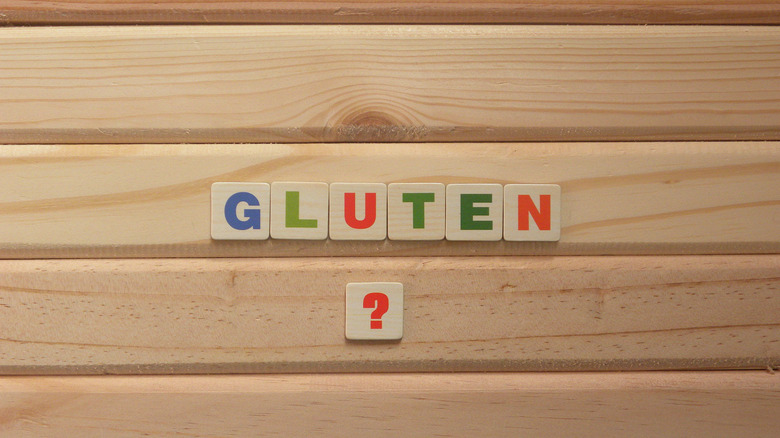Gluten Sensitivity May Not Actually Be Caused By Gluten
Have you been stopped eating gluten because it makes you sick? Or maybe you're not fully on board the GF train, but you're a fellow traveler, since foods with gluten irritate your stomach? If so, you're in good company. Studies suggest that one out of every four Americans has adopted a gluten-free or reduced-gluten diet (per the University of Nebraska). While only 1% of the population has been diagnosed with a gluten allergy (celiac disease), so many people have turned to going gluten-free in order to avoid any digestive side effects or other symptoms. If people eliminate wheat from their diet, and they start to feel better, doesn't it stand to reason that they have a problem with gluten?
Maybe, but not necessarily. A study performed at the Oslo University Hospital in Norway tested whether it was gluten that was really irritating people's stomachs ... or something else (per National Library of Medicine). Researchers worked with 59 people with a gluten sensitivity. They gave them one type of muesli bars to eat for a week: one with gluten, one without gluten but with fructan, and a placebo. Participants were asked to report their levels of discomfort, particularly bloating and stomach pain (per Healthline and Diet v.s. Disease)
Guess which one came in dead last at causing problems? If you guessed the bar full of gluten, you're right.
Some foods get all the blame
What caused the real issues? The bar full of fructan (via the National Library of Medicine). But what is fructan? It's another type of carbohydrate present in wheat, among other foods. Turns out fructan may be the real troublemaker, while gluten may just be the fall guy. There's a reason for the confusion, though: Wheat products contain fructan, and when patients eliminate gluten from their diets, they also eliminate one source of difficulties — fructan is present in wheat, spelt, rye, and barley. But fructan is also a part of many other gluten-free fruits and vegetables like watermelon, bananas, prunes, onions, shallots, garlic and Brussel sprouts — to name a few (via Ohio State University Health and Discovery).
The trouble with going gluten-free is that people can end up eliminating foods from their diets when they don't need to, and their symptoms may not improve as much as they could if they recognized the real bad guy. Fortunately, there are ways to tell the difference between a gluten and fructan sensitivity. The best place to start is by monitoring how you feel when you eat any high-fructan, low-gluten foods. If you find your stomach bothers you when you eat those, that's a sign that fructan may be the culprit.
Bad news for the bananas in your diet, but good news for bread and beer — which can make quite a difference, especially around the holidays.

